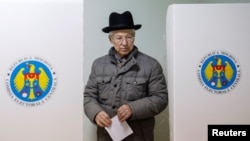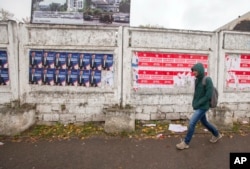Moldovans weary of a major banking crisis and worried about Russia’s influence will head to the polls to choose a new president who faces a tug-of-war over where the ex-Soviet republic’s political and economic ties lie.
The small country of 3.5 million is one of Europe’s poorest, a situation only worsened by the turmoil that erupted last year when nearly $1 billion -- around 10 percent of the country's gross domestic product (GDP) -- disappeared from three banks.
Igor Dodon, a Socialist, wants to reverse the country's move toward European integration, which included a historic Association Agreement signed in 2014 despite bitter opposition from Russia.
Dodon is leading in many opinion polls but may not garner enough votes to win outright in the October 30 vote.
Maia Sandu, a former World Bank economist and education minister, is Dodon’s leading challenger. She has warned about the danger of a closer economic relationship with Russia, which is Moldova's leading energy supplier.
On October 28, one of the country's leading church figures, Metropolian Vladimir, of the Moldovan Orthodox Church, publicly backed Dodon in a sermon. It's the first time in years that the church has waded into electoral politics at this level.
Though Moldovans are overwhelmingly Orthodox Christian, the Moldovan Orthodox Church competes for influence in the country with the Romanian Orthodox Church, a rivalry that mirrors the country's linguistic, ethnic, and cultural divide.
Russia also has thousands of troops stationed in the disputed, mainly Russian-speaking territory of Transdniester, which broke away following a short war in 1992 that killed some 1,000 people.
Russia still keeps a contingent of troops, ostensibly as peacekeepers, in the territory.
Also lurking in the background is tycoon Vlad Plahotniuc, who is considered Moldova’s most powerful businessman and who critics say has an outsized influence on domestic politics.
Polls show the 2015 banking crisis sapped many Moldovans’ enthusiasm for European integration. It also prompted the European Union and the International Monetary Fund (IMF) to suspend financial aid, though the IMF recently said it would resume its program.
The vote is the first since 1997 where the president will be elected by national balloting instead of by parliament.
RFE/RL's Moldovan service, Reuters and AFP contributed to this report.





